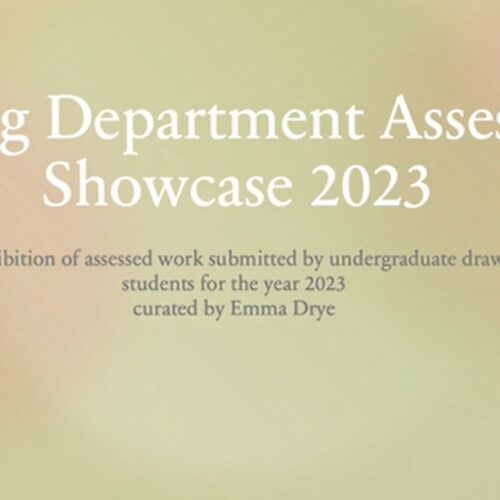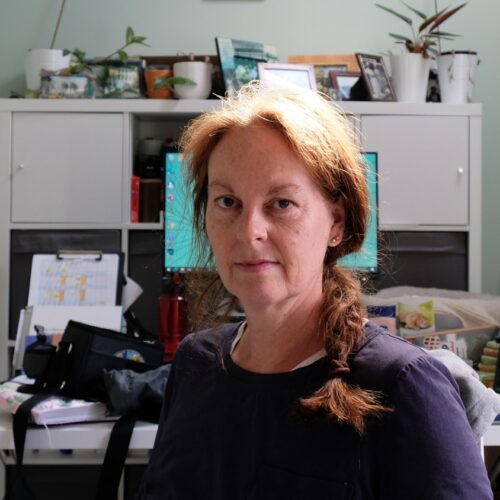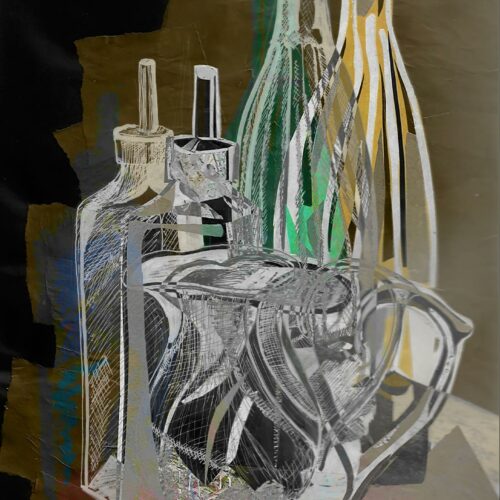
Composing and winged horses
As an OCA tutor, one of the most fascinating parts of my job is reading through Learning Logs and seeing how different people approach the various challenges and concepts that the courses present. I’m particularly interested in how a student’s ideas and tastes develop through the course, as well as the ‘eureka’ moments that make things slot into place for an individual student. There are many ways in which broader life experience can influence the learning process, with each student bringing a unique set of skills and knowledge to their learning experience. I have always felt that teaching is a two-way process, and that a good teacher can learn from their students, especially in terms of seeing things from different perspectives. The Learning Logs are a particularly good way of documenting aspects of the learning process, and the insights shared here can be invaluable for both student and tutor, as well as for helping tutors to understand what makes each particular student tick. This information can also be invaluable for other students who may be facing similar challenges and adventures in their own learning, and seeing how other students have solved particular problems can be enormously helpful.
One recent Learning Log entry particularly appealed to me. Marie Lester is a student on the Music Composition 1 course and has just completed her third assignment. Her winged horse analogy is appropriate to all students involved with developing creative practice and I felt it was too good not to share…

‘Recently my 5 year old son asked me to draw a horse with wings. It’s not unusual for him to ask me to draw things – and as usual, I Googled an image – this time of a horse with wings – and copied it. He was happy and proceeded to colour it in and cut it out, as his custom is. As I mused on my rather poor artistic skills and inability to draw most things without copying, I made a connection with composing. As I considered why I was unable to draw a horse (let alone a winged one!), I realised that I have only ever looked or glanced at a horse. I’ve never studied the form, the skeleton, the muscles of these beautiful creatures. (To be honest, I find most large animals rather intimidating, and am usually relieved to be separated by a fence or gate). If I had taken the time to study horses and if I had practised drawing them in the past, I may have been able to draw one immediately, at my son’s request. I could have taken inspiration from my own memories and the knowledge that had been internalised.
Suddenly, I understood the importance of studying and analysing music. My initial reaction to musical analysis was that it must be boring and laborious – and more significantly, the absolute antithesis of creativity. Although I am still very much a novice when it comes to music analysis and composing, I can say that I get it now. I see that without the study and knowledge of how and why music works (and also the reasons why at times, it doesn’t) I can’t draw from my own resources – I am forced, at best, to copy. When I study, the object of it becomes mine. It metamorphoses from being mere knowledge to the potential, the catalyst, for something new – not just a copy.
So now, I will press on to create more winged horses, musically speaking, of course.’






Couldn’t agree more Carla. I too thought that musical analysis was rather like pulling a flower apart but it is in fact very helpful and aids ones appreciation of a piece even if not always making one like the piece more.
One of the chief benefits of the Music Present to Past course aside from the analysis aspects is that one is encouraged to listen to music that one would normally run a mile from. And as a further benefit In this module I have had several of those wonderful moments when a piece just engages all your heart and mind – for me it was Beethoven’s String Quartet op 131, the first movement. I had intended to listen to the Quartets in a few years time and now realise how much there is still to discover.
As a by product I watched the BBC 4 programme on Kraftwerk who seemed in their way just as influential in the pop world with their synthesised sounds and electronica as Darmstadt and IRCAM have been in art music. I wonder what Andy thinks of them.
By the by, as one who approaches music from an emotional point of view (but not too emotional – I don’t really like Mahler) I have always looked askance at a mathematical approach to composition as epitomised by the Integral Serialists. I was therefore taken aback to find that composers were at it way back vide Guillaume de Machaut and his isorhythmic motets.
What a lovely story. I totally agree that you have to feed the mind with study to be able to come up with your own versions.
As a bit of light relief on terms of musical appreciation may I recommend Petula Clark’s BBC 4 programme on French chanson. She hits the nail on the head when she says that French song is about the words not the tune – the reverse is true for British and American song.
As a writer and poet, tutoring Creative Writing and also Creative Arts Today (and I regret there is no music in that course), I am aware how important study and analysis is for all the arts. That’s why in Creative Writing students are asked to write a commentary on the writing process of all their assignments, and at level 2 and 3, they are asked to write a Creative Reading Commentary, analysing other writers’ work. You need a critical eye, ear, and brain to appreciate other artist’s creative work, and equally your own.
What a beautiful – and inspiring – analogy; thank you for sharing that , Carla. There is so much music that I find I am hearing differently and that has become more closely a part of me as a result of the Learning Log for Music 2. And, as with the winged horse, there are these moments where the whole thing suddenly takes off,,,